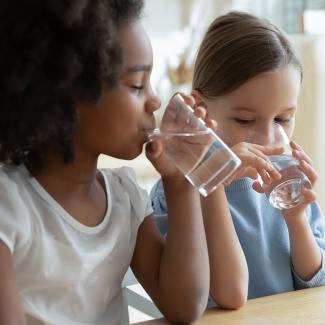
Purpose
In 2023, the Rhode Island Department of Education (RIDE), the University of Rhode Island (URI) Cooperative Extension Water Quality Program, and the Rhode Island Department of Health (RIDOH) collaborated to develop a voluntary, statewide program to test the drinking water for lead in K-12 public schools and licensed child care centers and family child care facilities. The results of that testing will be uploaded here when available. If you don’t see your facility here, check back periodically.
RIDOH cannot take any regulatory or legal action based on the results of this voluntary testing. RIDOH will provide results to the Department of Human Services, who may choose to work with your facility to help reduce lead if necessary.
The Water Infrastructure Improvements for the Nation Act (WIIN Act) addresses, supports, and improves America's drinking water infrastructure. Federal grant funds from the WIIN Act have been used to develop a program to test drinking water for lead at Rhode Island schools and child care facilities.
Any existing licensed child care facilities can sign up, including group family and family (home-based) child care facilities. Public schools that have not already participated can sign up as well. (English informational flyer, Spanish informational flyer)
Participants in this water testing program will:
- Have drinking water tested for lead for free;
- Get expert advice on how to lower lead levels, if needed; and
- Protect the health of children for years to come.
If you are interested in having your drinking water tested for lead, please complete this form.
If you have any questions, contact the Rhode Island Department of Health at 401-222-5960. Multilingual answering services are available.
*Financial support is available to replace some faucets and fountains. See Program to Replace Faucets and Fountains below for more information.
**RIDOH cannot take any regulatory or legal action based on the results of this voluntary testing. RIDOH will provide results to the Department of Human Services, who may choose to work with your facility to help reduce lead if necessary.
Key Information
Most lead in water comes from metal wearing away in old pipes, lead-based solder, or brass fittings on faucets or water fountains.
People can be exposed to lead by drinking contaminated water. Lead exposure can cause lifelong health problems. The effects are most serious for babies, young children, and people who are pregnant.
The only way to know if there is lead in drinking water is to test for it. If lead was found in any water sample, take appropriate actions based on the results.
Drinking water from schools and child care facilities throughout Rhode Island is being tested for lead. Each facility tested multiple water faucets and fountains.
From 2016 to 2018, drinking water from multiple water faucets and fountains in schools and child care facilities throughout Rhode Island were tested for lead. View these results online.
Program to Replace Faucets and Fountains
RIDOH has some federal funding to help schools and child care facilities cover the costs of replacing eligible faucets and fountains. RIDOH will determine eligibility based on the following criteria:
- Faucets and fountains are eligible for replacement if the sample results are greater than 4 parts per billion (ppb).
- Funding is available for replacement faucets and fountains, not for filters or other remediation actions.
- RIDOH will give facilities a list of options that meet the national standards for low lead or lead-free plumbing.
- Replacement faucets and fountains must be installed in the same facility and meet relevant plumbing standards. The original fixture must be permanently shut off or removed.
To learn more, view the full policy outlining use of remediation funds. Facilities with faucets and fountains that meet the criteria will receive information from RIDOH about participating in the remediation programs.
How data are collected
The University of Rhode Island Cooperative Extension (URI) and participating facilities identified water fountains and taps that are used for drinking or cooking to be sampled. Samples of drinking water were collected and transported to the State Health Laboratory by URI. The State Health Laboratory analyzed the water samples for lead. There was no cost to the school district or child care facility for these services.
Key Findings
- Information will be added as it become available.
